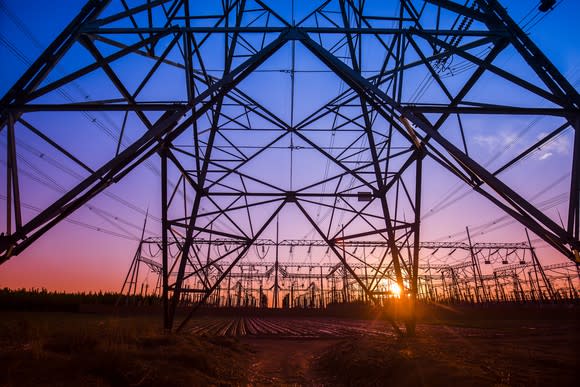3 High-Yield Utility Stocks
Utilities have long been a go-to option for income-seeking investors because these entities offer higher-than-average yields. Our investors have picked three excellent opportunities in the sector: NextEra Energy Partners (NYSE: NEP), Duke Energy (NYSE: DUK), and National Grid (NYSE: NGG). Read on to find out why we think this trio has what it takes to meet the needs of income-focused investors.
Renewable profits off renewable energy
Sean O'Reilly (NextEra Energy Partners): NextEra Energy Partners is a direct beneficiary of the massive shift toward renewable energy usage in the United States. This trend has two causes: government mandates for renewable energy usage, and the increasingly attractive economics of wind and solar power. NextEra Energy Partners serves as a majority-owned (79.9%) subsidiary of NextEra Energy (NYSE: NEE), was formed by NextEra Energy to own and manage clean energy projects with stable, long-term contracts to generate power for NextEra and other utilities.

Image source: Getty Images.
NextEra Energy Partners owns approximately 3,000 megawatts of solar- and wind-generating capacity, in addition to 542 miles of natural gas pipelines in some of the top regions in the country. Since going public in 2014, the limited partnership has managed to increase its distribution by more than 100% and boasts an average contract life of 18 years. There is strong evidence that it will continue to grow, and not just because renewables continue to gain traction as a source of energy. As highlighted in a recent investor presentation, parent NextEra Energy's current renewable portfolio alone provides a very attainable 12%-15% growth per year in NextEra Energy Partners' payout through 2022. With a current yield of 3.65%, this partnership is a utility you won't want to miss out on.
A high-yield utility with visible growth up ahead
Matt DiLallo (Duke Energy): Duke Energy is one of the largest energy infrastructure companies in the country. It operates large-scale electricity and natural gas utilities, related pipelines and transmission infrastructure, and a sizable renewable portfolio. These utility-type businesses generate relatively consistent cash flow that Duke uses to pay a generous dividend that currently yields just over 4.2%.
That payout has been a staple for Duke Energy, which has handed out cash to investors on a quarterly basis for the past 91 years, including giving them a raise every year for the last decade. That trend should continue because the company has $37 billion of growth projects underway that will modernize the grid, generate cleaner power, and expand its natural gas pipeline infrastructure. Overall, the company anticipates that these investments will increase its earnings per share by a 4% to 6% compound annual rate through 2021, which should support a similar pace of dividend growth.
That forecast positions Duke to generate an 8% to 10% total annual return for investors over the coming years. While it might not grow as fast as some rivals, it's still an ideal option for income-focused investors like retirees.
One of the most reliable dividend stocks in the utility business
Tyler Crowe (National Grid): Utilities are typically stable businesses because they sell into regulated markets. At the same time, though, those that produce electricity still have to face some of the challenges that come with operating in a commodity business.
What makes National Grid unique is that it doesn't even touch the electricity generation business. Rather, it sticks to distribution and transmission of electricity and natural gas in the U.S. and U.K. By completely avoiding the parts of the utility business that are exposed to commodity prices, the company has an extremely stable and predictable revenue stream that more or less guarantees a certain rate of return.
National Grid has been in the middle of a significant strategic change. First, it sold a portion of its natural gas distribution business in the U.K. and returned almost all of the cash proceeds to investors in the form of a special dividend and share repurchases. At the same time, it is dedicating increasingly larger portions of capital investments to its U.S. businesses, where it has a more favorable regulatory environment and greater investment opportunities. While the company's dividend growth has been historically low, its stock still has a dividend yield of 4.7%. National Grid has many investments in the U.S. to fuel modest growth for a long time.
Matthew DiLallo has no position in any of the stocks mentioned. Sean O'Reilly has no position in any of the stocks mentioned. Tyler Crowe has no position in any of the stocks mentioned. The Motley Fool owns shares of and recommends National Grid. The Motley Fool has a disclosure policy.

 Yahoo Finance
Yahoo Finance 